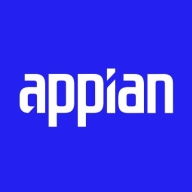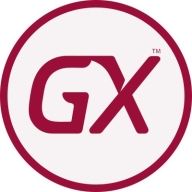

Appian and GeneXus are both key players in the low-code development category. Appian appears to have an advantage due to its extensive integration and data management capabilities.
Features: Appian offers advanced process modeling, case management, and seamless integrations, supporting quick time-to-market and ease of use. It also boasts strong data management and a cohesive architecture. GeneXus includes robust multi-language support, focusing on backend development with strong database management and automation capabilities.
Room for Improvement: Appian could improve in user interface customization, offline and mobile features, scalability, and error tracking. In contrast, GeneXus needs enhancements in frontend capabilities, interface design, collaboration tools, performance, and security considerations.
Ease of Deployment and Customer Service: Appian offers public, hybrid, and on-premises deployment options with generally well-regarded customer service, though resolution times might slow due to workload. GeneXus primarily supports on-premises deployment with less comprehensive technical support compared to Appian.
Pricing and ROI: Appian is expensive but justified by efficiency gains and faster time-to-market, offering flexible licenses for large enterprises. GeneXus, although costly, enables significant backend productivity beneficial for large backend operations, achieving ROI through streamlined processes despite a potentially high initial cost for smaller operations.
Using Appian is saving us five full-time employees, which is significant since we currently have only four team members.
They see return on investment in terms of cost savings, time savings, more efficient processes, and more efficient employees.
Appian is very efficient, allowing us to build a lot of applications within a financial year, making it cost-effective.
I would give Appian's customer support 10 out of 10 due to their next-level support.
The technical support for Appian rates as 10 out of 10 because they have a great support team.
Their customer service is responsive, and the team is very prompt for support.
On a scale of one to 10, Appian rates as a nine for scalability.
Our volume has increased by 20% in the two years since using Appian, and it can handle the increased volume effectively.
Appian is scalable, but it depends on how you build your applications.
We have tested Appian during peak usage and off-peak times, and we have not experienced any issues such as lagging or system disruptions.
It depends on how it has been designed and how it has been configured.
The stability of Appian would rate as nine, as it's a stable environment.
If Appian can suggest the country based on that address, it would significantly decrease error rates in processing remittance.
It has room to improve for use cases where the users are public facing, where anonymous users could come to a site and run a business workflow or interact with some data.
If there is a very complex process that includes a lot of data transitioning and memory-centric processes, it consumes a lot of memory.
Appian provides value for money, is easy to use, has a straightforward setup procedure, and offers great support from the Appian team.
On the pricier side, both Appian and Pega are enterprise-level solutions, placing them on the slightly higher side.
The pricing of Appian is based on the number of users and generally ranges from 70 to 100 USD per user per month.
Previously we could process only five to ten transactions within an hour, but now, after switching to Appian, we can process about 100 transactions in an hour, making it 10 times faster.
Appian is aiding in leveraging AI technologies in multiple ways: one way is for developers, as they make development efficient and quick by enabling developer co-pilots across various phases of the application, which helps design Appian quickly and provides suggestions along the way.
The zero-code integration feature is remarkable, allowing for ease of data transfer and workflow enhancement.
| Product | Market Share (%) |
|---|---|
| Appian | 5.8% |
| GeneXus | 0.8% |
| Other | 93.4% |


| Company Size | Count |
|---|---|
| Small Business | 20 |
| Midsize Enterprise | 9 |
| Large Enterprise | 42 |
| Company Size | Count |
|---|---|
| Small Business | 12 |
| Large Enterprise | 2 |
Appian is a unified low-code platform and solution used by businesses to build enterprise applications and workflows. This product adapts to the needs of clients and the technologies they are already using to combine their data in a single workflow and maximize resources. The platform has four main components through which it transforms the work process for companies of various sizes. They are:
Appian is utilized across a diverse set of industries, including automotive and manufacturing, energy and utilities, education, financial services, telecom and media, transportation, retail, insurance, healthcare, and life sciences. The most frequent use cases of Appian are customer journey, governance, risk and compliance, operational efficiency, supply chain, distributed order management, and environmental, social, and governance (ESG) management.
Appian Features
Appian has various features that allow users to create solutions for their businesses. These features can be separated into a few groups according to function, including automation, low-code application development, and integrations and data. Some of the most frequently used features of Appian include:
Appian Benefits
The benefits of using Appian include:
Reviews from Real Users
A practice leader - digital process automation at a computer software company values Appian highly because the product is easy to develop, low-code, and has a good user interface.
Alan G., an advisory board member at Codecon VR, Appian offers a clear application life cycle, easy to learn documentation, and comes with a fundamentals course.
What is GeneXus? GeneXus™ is the best Low-Code Platform that you don't know yet.
It's a Software Development Platform that simplifies and automates the tasks of creating and evolving enterprise applications and multi-channel user-experiences. Great Advantages:
- Higher productivity, with automatic maintenance & evolution
- Multi-Experience, we continuously create new code generators
- Agile, incremental approach, with fully functional prototypes
- Easier to learn, one single language to cover all technologies
- Future-proof, we've been around for 30 years, evolving for you
Key Differentiators against the competition:
- No runtime fees, we charge by developer
- Best theoretical framework, which allows us to evolve
- Best coverage in the market: Most technologies, most languages, most markets and industries
- We run on-premise or on the cloud
- Multiple starting points depending on the type of company you work in, with products for Students, Startups, ISVs, Corporate Development, and SAP technologies
GeneXus uses Artificial Intelligence techniques to create software, enabling truly incremental development of apps, providing a low-code, future-proof development platform for the leading execution platforms and languages, and the most popular DBMS.
We monitor all Low-Code Development Platforms reviews to prevent fraudulent reviews and keep review quality high. We do not post reviews by company employees or direct competitors. We validate each review for authenticity via cross-reference with LinkedIn, and personal follow-up with the reviewer when necessary.